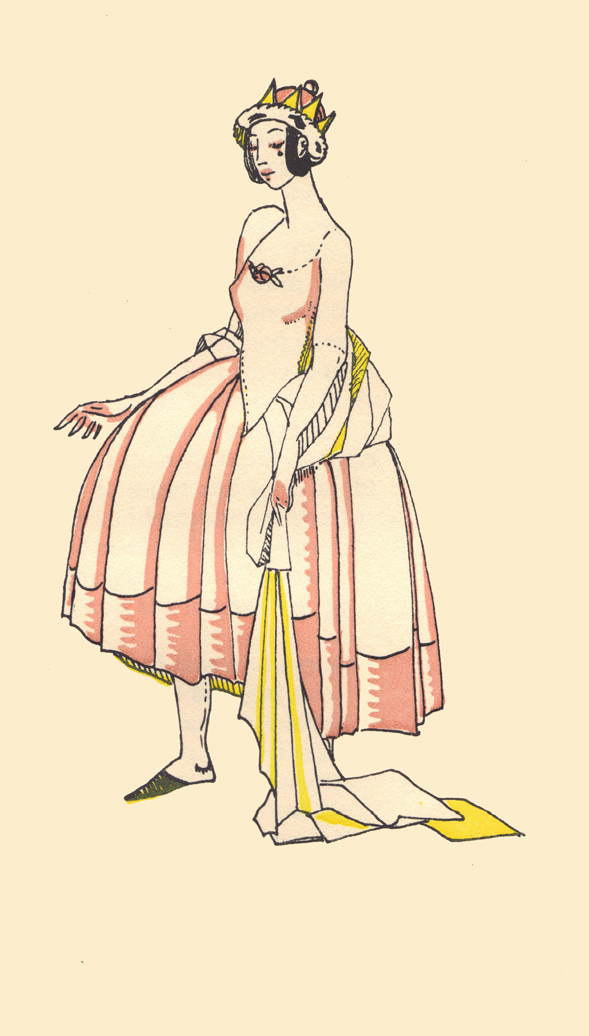
From The Luck of the Bean-Rows, a Fairy-tale for Lucky Children, illustrated by Claud Lovat Fraser, London: Daniel O’Connor, [1921]; pp. 3-40.
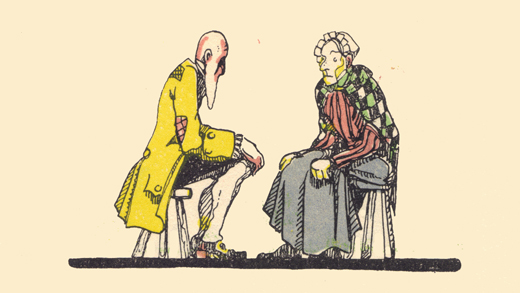
ONCE UPON A TIME
there was a man and his wife who
were very poor and very old. They had
never had any children, and this
was a great trouble to them, for
they foresaw that in a few years
more they would not be able to
grow their beans and take them to
market.
One day while they were weeding
in their field (that with a little
cabin was all they possessed — I
wish I owned as much!) — one day,
I say, while they were getting rid
of the weeds the old woman spied in
a corner, where they grew thickest,
a small bundle very carefully tied
up; and what should she find in it
but a lovely boy, eight or ten
months old to look at, but quite
two years in intelligence! He had
been weaned; at all events
he needed no pressing to partake of
boiled beans, which he raised to his
mouth very prettily.

On hearing his wife’s cries of
surprise, the old man hurried from
the end of the field; and when
he too had gazed at the beautiful
child God had given them these
old people embraced each other with
tears of joy, and then returned
quickly to their cabin lest the
falling dew should hurt their boy.
When they were snug in the
chimney corner it was a fresh
delight to them to see the little
fellow reach out his hands to them,
laughing winsomely, and calling
them mamma and pappa, as though
he had known no other father or
mother.
The old man took him on his knee
and danced him gently up and
down, in ‘the way the ladies ride
in the Park,’ and said all sorts of
droll things to amuse him; and the
child responded in his own prattling
fashion, for who would like to seem
backward in such jolly talk?
Meanwhile the old woman lit up
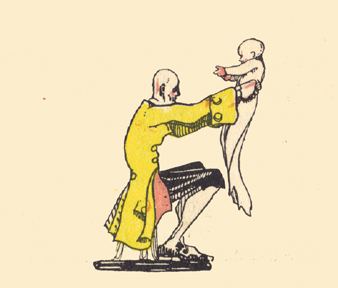
the house with a fire of dry bean-
pods, which gladdened the little
body of the newcomer, and prepared
an excellent bean-pap which
a spoonful of honey made delicious
eating. Then she laid him to sleep
in his fine white night-clothes in
the best bed of bean-chaff in the
house; for these poor folk knew
nothing of feather-beds and
eider-downs. When he was fast
asleep, ‘There is one thing that
bothers me,’ said the old man to
his wife, ‘and that is what we are
to call this bonnie boy, for we
know neither his parents nor
where he comes from.’

‘We must call him,’ said the old
woman, for though she was but a
simple peasant she was quick-
witted, ‘the Luck of the Bean-
rows, for it was in our bean-field
he came to us, the best of luck,
to comfort us in our old age.’
‘There could not be a better
name,’ the old man agreed.
It would make the story too long to
tell what happened in the days and
in all the years that followed; it is
enough to know that the old people
kept getting older and older, while
one could almost see Luck of the
Bean-rows putting on strength and
good looks. Not that he was mighty
of his inches, for at twelve he was
only two and a half feet, and when
he was at work in the bean-field,
of which he was very fond, you
could hardly have seen him from
the road, but his small figure was
so shapely, and he was so winning
in his looks and ways, so gentle, and
yet so sure of his words, and he
appeared so gallant in his sky-blue
smock, red belt, and gay Sunday
bonnet with bean blossoms for
feathers, that people wondered at
him and many believed that he was
really an elf or a fairy.
Many things, I grant, encouraged
this notion. First of all, the cabin
and the bean-field — the bean-field

in which a few years ago a cow
would have found nothing to graze
on — had become one of the fine
estates of the country-side; and
not a soul could tell how it had
happened. Well, to see beanstalks
sprouting, to see them flowering,
to see the blossom fading and the
beans swelling ripe in the pods —
there is nothing out of the common
in that, but to see a whole bean-
field expanding, spreading out,
with never a strip of land added,
whether bought or knavishly taken
from a neighbour’s holding — that
gets beyond understanding.
And all the while the bean-field
went on growing and spreading.
It spread to the south wind, it
spread to the north wind, it spread
towards the dawn, it spread towards
the sunset. And the neigbours
measured their land to no purpose;
they always found it full measure
with a rod or two to the good, so
they naturally concluded that the
10
whole country was getting bigger.
Then again the beans bore so
heavily that the cabin could never
have contained the crop, had it
not also grown larger. And yet for
more than five leagues round the
bean-crop failed, so that beans
had become priceless because of
the quantities sought for the tables
of lords and kings.
In the midst of this abundance
the Luck of the Bean-rows saw
to everything himself, turning the
soil, sorting the seed, cleansing
the plants, weeding, digging,
hoeing, harvesting, shelling, and,
over and above, trimming hedges
and mending wattle-fences. What
time was left he spent bargaining
with the market people, for he
could read, write, and keep accounts,
though he had no schooling.
He was indeed a very blessing of
a boy.
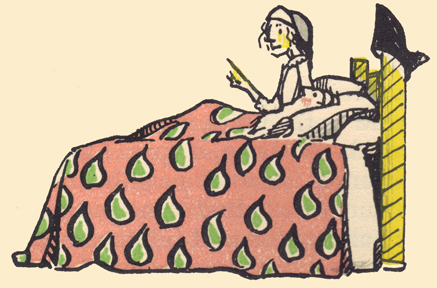
One night, when the Luck was
11
asleep, the old man said to his
wife: ‘There is Luck of the
Bean-rows now, who has done so
much to make us comfortable that
we can spend the few years that
are left us in peace and without
labour. In making him heir to all
we own we have given him only
what is already his; and we
should be thankless indeed if we
did not try to secure him a more
becoming position in life than
that of a bean-merchant. A pity
he is too modest for a professor’s
chair in the universities, and is
just a trifle too short for a general.’
‘It’s a pity,’ said the old woman,
‘he hasn’t studied enough to
pick up the Latin names for five
or six diseases. Eh, but they would
be glad to make him a doctor right
off!
‘Then as to law-suits,’ the old
man went on, ‘I am afraid he has
too much brains and good sense to
clear up one of them.’
;I have always had a fancy,’ said
the old woman, ‘that when he
came of age he would marry
Pea-Blossom.’
‘Pea-Blossom,’ rejoined the old
man, shaking his head, ‘is far
too great a princess to marry a
poor foundling, worth no more
than a cabin and a bean-field.
12
Pea-Blossom, old dear, is a match
for a squire or a justice of the
peace, or for the king himself, if
he came to be a widower. We are
talking of a serious matter, do
speak sense.’
‘Luck of the Bean-rows has more
sense than both of us together,’
said his wife after a moment’s
thought. ‘Besides, it is his
business, and it would not be
proper to press it further without
asking his opinion.’
Whereupon the old couple turned
over and went to sleep.
Day was just breaking when the
Luck leaped out of bed to begin
work in the field as usual. Who but
he was surprised to find his
Sunday clothes laid out on the
chest where he had left his others
at bedtime? ‘It is a week-day,
anyway,’ he said to himself, ‘if
the almanack hasn’t gone wrong.
Mother must be keeping some
holiday of her own to have set out
my best things. Well, let it be as
she wishes. I would not cross her
in anything at her great age, and
after all it is easy to make up for
an hour or two by rising earlier
or working later.’
So after a prayer to God for the
health of his parents and the
progress of the beans, he dressed
13
as handsomely as he could. He
was about to go out of doors, if
only to cast an eye at the fences
before the old couple awoke, when
his mother appeared on the
threshold with a bowl of good
steaming porridge, which she
placed with a wooden spoon on
his little table.
‘Eat it up, eat it up!’ she said;
‘do not be sparing of this porridge
sweetened with honey and a pinch
of green aniseed, just as you liked
it when you were a little fellow;
for the road is before you, laddie,
and it is a long road you will travel
to-day.’
‘That is good to hear,’ said Luck
of the Bean-rows, looking at her
in surprise; ‘and where are you
sending me?’
The old woman sat down on a
stool, and with her two hands on
her knees, replied with a laugh:
‘Into the world, into the wide
world, little Luck. You have never
seen any one but ourselves, and a
few poor market folk you sell your
beans to, to keep the house going,
good lad. Now one day, one day,
you will be a big man if the price
of beans keeps up, so it will be
well for you, dearie, to know some
people in good society. I must tell
you there is a great city four or
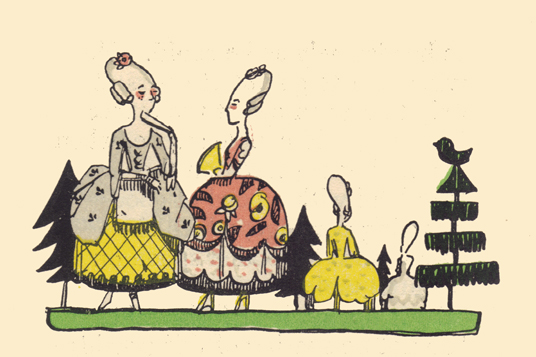
five miles away where at every step
one meets lords in cloth of gold
and ladies in silver dresses with
trails of roses. Your bonnie little
face, so pleasant and so lively,
will be sure to win them; and I
shall be much mistaken if the
day goes by without your getting
some distinguished appointment
at Court or in the public offices,
where you may earn much and do
little. So eat it up and do not
spare the good porridge sweetened
with honey and a pinch of green
aniseed.
‘Now as you know more about
the price of beans than about the
value of money,’ the old woman
went on, ‘you are to sell in the
market these six quart measures of
choice beans. I have not put more
lest you should be overburdened.
Besides, with beans as dear as
they are now, you would be hard
15
set to bring home the price even
if they paid you only in gold. So
we propose, father and I, that you
should keep half of what you get
to enjoy yourself properly, as
young people should, or in buying
yourself some pretty trinket to
wear of a Sunday, such as a silver
watch with ruby and emerald seals,
or an ivory cup and ball, or a
Nuremberg humming-top. The
rest of the money you can put in
the bank.

‘So away with you, my little
Luck, since you have finished your
porridge; and be sure that you
do not lose time chasing butterflies,
for we should die broken-hearted
if you were not home before
nightfall. And keep to the roads
for fear of the wolves.’
‘I will do as you bid me, mother,’
replied the Luck of the Bean-rows,
hugging the old woman, ‘though
for my part I would sooner spend
the day in the field. As for wolves,
16
they don’t trouble me with my
weeding-hook.’
So saying he slung his pronged
hoe in his belt, and set out at a
steady pace.
‘Come back early,’ the old
woman kept calling after him; she
was already feeling sorry that she
had let him go.
Luck of the Bean-rows tramped
on and on, taking huge strides like
a five-foot giant, and staring left
and right at the strange things he
saw by the way. He had never
dreamed that the world was so
big and so full of wonders.
When he had walked for an hour
or more, as he reckoned by the
height of the sun, and was puzzled
that he had not yet reached the
great city at the rate he was going,
he thought he heard some one
calling after him: ‘Whoo, whoo,
whoo, whoo, twee! Please do
stop, Master Luck of the Bean-
rows.’
‘Who is it calling me?’ cried
Luck of the Bean-rows, clapping
his hand on his pronged hoe.
‘Please do stop at once. Whoo,
whoo, whoo, whoo, twee! It is I
who am calling you.’
‘Can it be possible?’ asked
Luck, raising his eyes to the top
of an old pine, hollow and half dead,
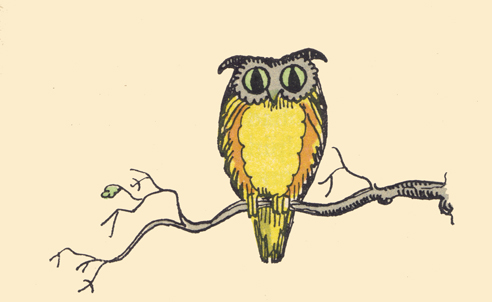
on which a great owl was swaying
in the wind. ‘What is it we two
can settle together, my bonnie
bird?’
‘It would be indeed a wonder if
you recognized me,’ answered the
owl, ‘for you had no notion that
I was ever helping you, as a
modest and honest owl should, by
devouring at my own risk the
swarms of rats which nibbled
away half your crops, good year
and bad year. That is why your
field now brings you in what will
buy you a pretty kingdom, if you
know when you have enough.
As for me, who have paid dearly
for my care of others, I have not
one wretched lean rat on the hooks
of the larder against daylight, for
now at night, with my eyes grown
so dim in your service, I can
scarcely see where I am going. So
I called to you, generous Luck of
the Bean-rows, to beg of you one
of those good quart measures of
beans hanging from your staff. It
will keep me alive till my oldest
son comes of age, and on his
loyalty to you you may reckon.’
‘Why that, Master-Owl,’ cried
Luck of the Bean-rows, taking
one of his own three quart
measures from the end of his staff,
‘is a debt of gratitude, and I am
glad to repay it.’
The owl darted down on the
measure, caught it in his claws and
beak, and with one flap of the wing
19
carried it off to the tree-top.
‘My word, but you are in a hurry
to be off!’ said the Luck. ‘May
I ask, Master Owl, if I am still
far from the great town mother is
sending me to?’
‘You are just going into it,’
answered the owl, as he flitted off
to another tree.
Luck of the Bean-rows went on
his way with a lighter staff; he
felt sure he must be near the end
of his journey, but he had hardly
gone a hundred steps when he
heard some one else calling:
‘Behh, behh, bekky! Please stop,
Master Luck of the Bean-rows!’
‘I think I know that voice,’ said
the Luck, turning round. ‘Why
yes, of course! It is that bare-faced
rogue of a mountain she-goat,
which prowls around my field with
her kids for a toothsome snack. So
it is you, is it, my lady raider?’
‘What is that about raiding, fair
Master Luck? I guess your hedges
are too thick, your ditches too
deep, your fences too close for
any raiding. All one could do was
to nip a few leaves that pushed
through the chinks of the wattles,
and our pruning makes the stalks
thrive. You know the old saying:
Sheeps’ teeth, loss and trouble,
Goats’ teeth pay back double.’
20
‘Say no more,’ broke in Luck of
the Bean-rows; ‘and may all the
ill I wished you fall upon my own
head. But why did you stop me,
and what can I do to please you,
Madame Doe?’
‘Misery me!’ she sobbed,
dropping big tears, ‘Behh, behh,
bekky! it was to tell you that the
wicked wolf had killed my
husband, the buck; and now my
little orphan and I are in sore
need, for he will forage for us no
more; and I fear my poor little
kid will die of hunger if you
cannot help her. So I called
to you, noble Master Luck of the
Bean-rows, to beg of pity one of
those good quart measures of
beans hanging from your staff. It
will keep us till we get help from
our kinsfolk.’
‘What you ask, Lady Doe,’ said
the Luck, taking one of his two
measures from his staff, ‘is an
act of compassion and good-will,
and I am glad to do it for you.’

The goat caught up the measure
in her lips, and one bound carried
her into the leafy thicket.
‘My word, but you are in a hurry
to be off!’ cried Luck of the
Bean-rows. ‘May I ask you, dear
lady, if I am still far from the
great town mother is sending me
to?’
‘You are there already,’ answered
the goat as she buried herself deep
in the bushes.
Once more the Luck went on his
way, his staff the lighter by two
measures. He was looking
out for the walls of the big town
when he noticed by a rustling
along the skirt of the woods that
some one was following him closely.
He turned quickly towards the
sound, with his pronged hoe
gripped hard in his hand. Well
for him that the prongs were open,
for the prowler that was tracking
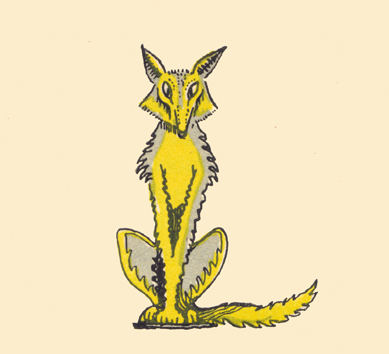
was a grim old wolf whose
appaerance promised no good.
‘So it is you, evil beast!’ cried
Luck. ‘You hoped to give me the
place of honour at your evening
spread! By good fortune my two iron
teeth,’ and he glanced at his hoe,
‘are worth all yours together,
though I would not belittle them;
so you may take it as settled, old
crony, that you are to sup this
evening without me. Consider
yourself in luck, too, if I do not
avenge the husband of the she-
goat and the father of the kid
who have been brought into pitiful
straits by your cruelty. Perhaps I
ought to, and it would only be
justice, but I have been brought
up with such a horror of blood
that I am loth to shed even a
wolf’s.’
So far the wolf had listened in
deep humility; now he suddenly
broke into a long and lamentable
howl and turned up his eyes to
heaven as if calling on it to bear
witness.
‘Oh, power divine, who clothed
me as a wolf,’ he sobbed, ‘you
know if ever I felt wicked desires
in my heart. However, my lord,’
he added, with a bow of resignation
towards Luck of the Bean-rows,
‘it lies with you to dispose of my
wretched life. I place it at your
mercy without fear and without
25
remorse. If you think it right
to make my death atone for the
crimes of my race I shall die at
your hands without repining; for
ever since I fondled you in your
cradle with pure delight, when
your lady mother was not there, I
have ever loved you dearly and
truly honoured you. Then you
grew so handsome, so stately,
that, only to look at you, one
might have guessed you would
become a great and magnanimous
prince, as you have. Only I beg
you to believe, before you condemn
me, I did not stain these claws in
the blood of the doe’s luckless
mate.
‘I was brought up on principles of
restraint and moderation — my fell
is sprinkled with grey — but through
all the years I have never swerved
from them. At the time you
mention I was abroad among my
scattered tribesfolk, proclaiming
sound moral doctrines in the hope
of leading them by word and
example to a frugal standard of
living, that high aim of wolfish
character. I will go further, my
lord; that mountain goat was my
good friend. I encouraged
promising qualities in him; often
we travelled together, discoursing
by the way, for he had a bright
26
wit and eagerness to learn. In my
absence a sad quarrel for precedence
(you know how touchy these rock
people are on this point) was the
cause of his death, which I have
never got over.’
The wolf wept — from the very
depth of his heart it seemed, as
inconsolable as the doe herself.
‘For all that and all that,’ said
the Luck of the Bean-rows, who
had kept the prongs of his weeding-
hook open, ‘you were stalking
me.’
‘Following you, following you,
yes,’ replied the wolf in wheedling
tones, ‘in the hope of interesting
you in my benevolent purpose,
but in some more suitable place
than this for conversation. Ah, I
said to myself, if my lord Luck
of the Bean-rows, whose reputation
is spread far and wide, would but
share in my scheme of reform, he
would have to-day a splendid
opportunity. I warrant that one
quart measure of those dainty
beans hanging from his staff would
convert a tribe of wolves, wolflings,
and cubs to a vegetable diet, and
preserve countless generations of
bucks, does, and kids.’
‘It is the last of my measures,’
thought the Luck to himself, ‘but
what do I want with cups and
27
balls, rubies and humming-tops?
And who would put child’s play
before something really useful?
‘There are your beans,’ he said
as he took the last measure his
mother had given him for his
amusement. All the same he did
not shut the prongs of his hoe.
‘It is all that is left of my own,’
said he, ‘but I don’t regret it;
and I shall be grateful to you,
friend wolf, if you put it to the
good use you have promised.’
The wolf snapped his fangs on it
and bounded away to his den.
‘My word,’ said Luck of the
Bean-rows, ‘you are in a hurry
to be off! May I ask, Master Wolf,
if I am still far from the great
town mother is sending me to?’
‘You have been there for long
enough,’ replied the wolf, laughing
out of the corner of his eyes;
‘and stay there a thousand years
you will see nothing new.’
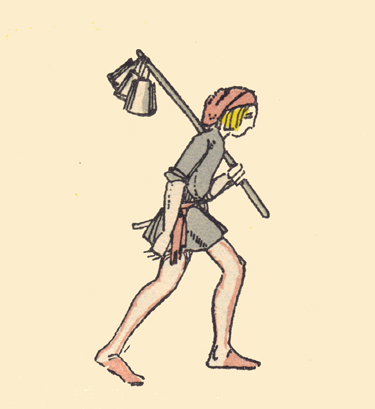
Yet once more Luck of the
Bean-rows went on his way, and
kept looking about for the town
walls, but never a glimpse of them
was to be seen. He was beginning
to feel tired when he was startled
by piercing cries which came from
a leafy by-path. He ran towards
the sound.
‘What is it?’ he shouted, and
gripped his weeding-hook. ‘Who
is it crying for help? Speak; I
cannot see you.’
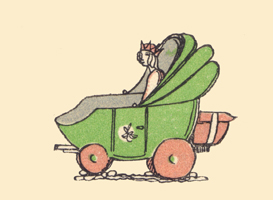
‘It is I, it is Pea-blossom,’
30
replied a low, sweet voice. ‘Oh,
do come and get me out of this
fix, Master Luck of the Bean-rows.
It is as easy as wishing and will cost
you nothing.’
‘Believe me, madam,’ said the
Luck, ‘it is not my way to count
the cost when I can help. Whatever
I have is yours to command,
except these three quart measures
of beans on my staff; they are
not mine, they belong to father
and mother. Mine I have just
given away to a venerable owl, to
a saintly wolf who is preaching
like a hermit, and to the most
charming of mountain does. I
have not a bean leaf that I can
offer you.’
‘You are laughing at me,’ returned
Pea-Blossom, somewhat displeased.
‘Who spoke of beans, sir? I have
no need for your beans; they
are not known in my household.
The service you can do me is to
turn the door-handle of my carriage
and throw back the hood — it is
nearly smothering me.’
‘I shall be delighted, madam,’
said Luck of the Bean-rows, ‘if
I could only discover your carriage.
No trance of a carriage here! And
no room to drive on such a narrow
path. Still I shall soon find it, for
31
I can hear that you are quite close
to me.’
‘What!’ she cried with a merry
laugh, ‘you cannot see my
carriage! Why, you almost
trampled on it, running up in
your wild way. It is right in front
of you, dear Luck of the Bean-rows.
You can tell it by its elegant
appearance, which is something
like a dwarf pea.’
‘It is so like a chick pea,’ thought
the Luck as he bent down, ‘that
if I hadn’t looked very close I
should have taken it for nothing
but a chick pea.’
One glance, however, showed him
that it was really a very large
dwarf pea, round as an orange,
yellow as a lemon, mounted on
four little golden wheels, equipped
with a dainty ‘boot,’ or hold-all,
made of a tiny peascod as bright
and green as morocco.
He touched the handle; the door
flew open; and Pea-Blossom
sprang out like a grain of touch-
me-not, and lighted nimbly and
gaily on her feet.

33
The Luck stood up in amazement;
never had he conceived of any one
so lovely as Pea-Blossom. Her face,
indeed, was the most perfect a
painter could have imagined —
sparkling almond eyes of a
wonderful violet, and a small
frolicsome mouth which showed
glimpses of bright teeth as white
as alabaster. Her short dress,
slightly puffed out and brocaded
with sweet peas, came just below
the knee. She wore tight stockings
of white silk; and her adorable
little feet — why, one envied the
lucky shoemaker who shod them
in satin.
‘What can you be staring at?’
she asked, which shows, by the
way, that Luck of the Bean-rows
was not making a very brilliant
appearance.
The Luck blushed, but quickly
recovered himself. ‘I was
wondering,’ he said modestly,
‘how so beautiful a princess, just
about my own size too, could
possibly find room in a dwarf pea.’
‘What a mistake to speak so
slightingly of my carriage, Luck
of the Bean-rows. It is a most
comfortable carriage when it is
open. And it is quite by chance
that I have not my equerry, my
almoner, my tutor, my secretary,
34
and two or three of my ladies-in-
waiting with me. But I like driving
alone, and this fancy of mine caused
the accident that has happened
to me to-day.
‘I don’t know whether you have
met the king of the crickets in
company; no one could mistake
his glittering black mask, like
Harlequin’s, with two straight
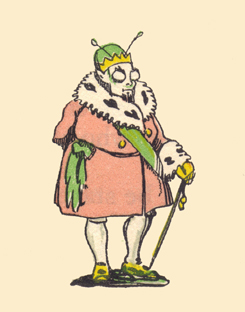
movable horns, and his shrill sing-
song whenever he speaks. The
king of the crickets condescended
to fall in love with me. He is
quite well aware that I come of
age to-day, and that it is the
custom for the princesses of our
house to choose a husband when
they are ten years old. So he put
himself in my way — that too is the
custom — and beset me with a
frightful racket of piercing
declarations. I answered him —
35
also according to custom — by
stopping my ears.’
‘Oh, joy!’ exclaimed the Luck
in rapture. ‘You are not going to
marry the king of the crickets?’
‘I am not going to marry him,’
Pea-Blossom declared with dignity.
‘My choice is made. But no
sooner had I given my decision
than the odious Crik-Crik (that
is his name) flung himself on my
carriage like a wild monster, and
slammed down the hood. “Get
married now, saucy minx,” he
shrieked, “get married if any one
ever comes a-wooing you in this
plight. I don’t care a chick pea
either for your kingdom or
yourself.” ’
‘But do tell me,’ cried Luck of
the Bean-rows indignantly, ‘in
what hole this king of the crickets
is skulking. I will quickly hoe him
out and fling him bound hand and
foot to your mercy. And yet,’ he
continued, as he rested his head
on his hand, ‘I can understand
his desperation. But is it not my
duty, princess, to escort you to
your realm and protect you from
pursuit?’
‘That would certainly be advisable
if I were far from the frontier,’
answered Pea-Blossom, ‘but
yonder is a field of sweet-peas
36
which my enemy dare not
approach, and where I can count
upon my faithful subjects.’
As she spoke she struck the
ground with her foot, and fell,
clinging to two swaying stalks,
which bent under her and then
sprang up again, scattering their
fragrant blossom over her hair.
As Luck of the Bean-rows watched
her with delight — and I assure you
I would have been delighted too —
she pierced him with her bright
eyes, and he was so spell-bound
in the maze of her smile that he
would have been happy to die
watching her. At the least he might
have been still standing there had
she not spoken.
‘I have delayed you too long
already,’ she said, ‘for I know
what a stirring business the trade
in beans must be just at present;
but my carriage — or rather your
carriage — will enable you to
recover the time you have lost.
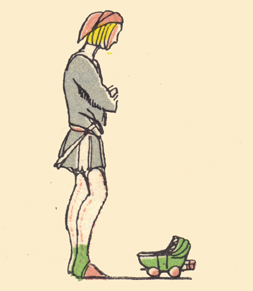
Please do not hurt my feelings
by refusing so slight a gift. I have a
thousand carriages like it in the
corn-lofts of the castle, and when
I would like a new one I pick it
out of a handful and throw the
rest to the mice.’
‘The least of your highness’s
favours would be the pride and
joy of my life,’ replied the Luck
of the Bean-rows, ‘but you have
forgotten that I have luggage. I
can easily imagine that however
closely my bean measures may be
filled I could manage to find room
for your carriage in one of them,
but to get my measure into your
carriage, that would be impossible.’
‘Try it,’ laughed the princess as
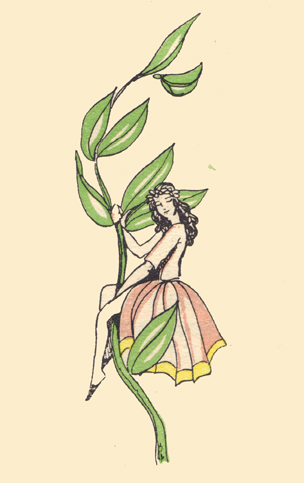
she swung up and down on the
sprays of the sweet-peas; ‘try it,
and do not stand amazed at
everything, as if you were a little
child who had seen nothing.’
And indeed Luck of the Bean-
rows had no difficulty in getting
his three quart-measures into the
body of the carriage — it could
have held thirty and more, and he
felt rather mortified.
‘I am ready to start, madam,’
he said, as he took his place on a
plump cushion, which was large
enough to let him sit comfortably
in any position, or even to lie at
full length if he had been so
minded.
‘I owe it to my kind parents,’
he continued, ‘not to leave them
in suspense as to what has become
of me this first time of my ever
leaving them; so I am waiting
only for your coachmen, who fled,
no doubt in terror at the outbreak
of the king of the crickets, and
took the horses and shafts with
him. I shall then leave this spot
with everlasting regret that I
should have seen you without
hope of ever seeing you again.’
The princess did not appear to
notice the marked feeling of the
Luck’s last words.
‘Why,’ she said, ‘my carriage
39
does not need either coachman,
shafts, or horses; it goes by
steam, and at any hour it can
easily do fifty thousand miles.
You see you will have no trouble
in getting home whenever it suits
you. You have just to remember
the gesture and words with which
I start it.
‘In the boot you will find various
things that may be useful on the
journey; they are every one of
them yours. You open the boot as
you would shell a green pea. There
you will see three caskets, the
shape and size of a pea, each
fastened by a thread which keeps
them in their cases like peas in a
pod, so that they cannot jolt
against each other when you travel
or when you remove them. It is a
wonderful contrivance!
‘They will open at the pressure
of your finger — like the hood of
my carriage. Then all you have to
do is to make a hole in the ground
with your hoe, and sow some of
their contents in it, to see whatever
you may wish spring up, sprout
and blossom. Is not that wonderful?
‘Only remember this! — when
the third casket is empty I have
nothing else to offer you; for I
have only three green peas, just
as you had three measures of
40
beans; and the prettiest girl in
the world can give you no more
than she has.
‘Are you ready to set out now?’
The Luck of the Bean-rows bowed;
he felt that he could not speak.
Pea-Blossom snapped her thumb
and middle finger: ‘Off, chick
pea!’ she cried; and the field of
sweet-peas was left nine hundred
miles behind, while Luck of the
Bean-rows was still turning this
way and that, looking in vain for
Pea-Blossom.
‘Alas!’ he sighed.
